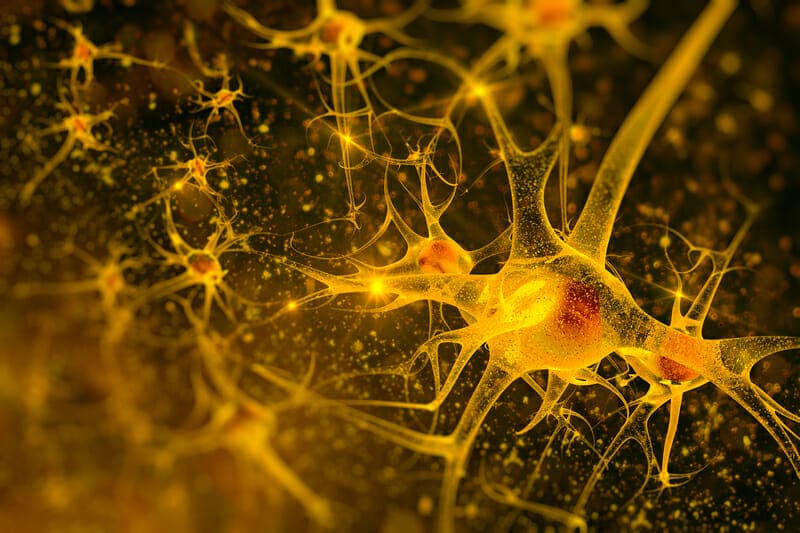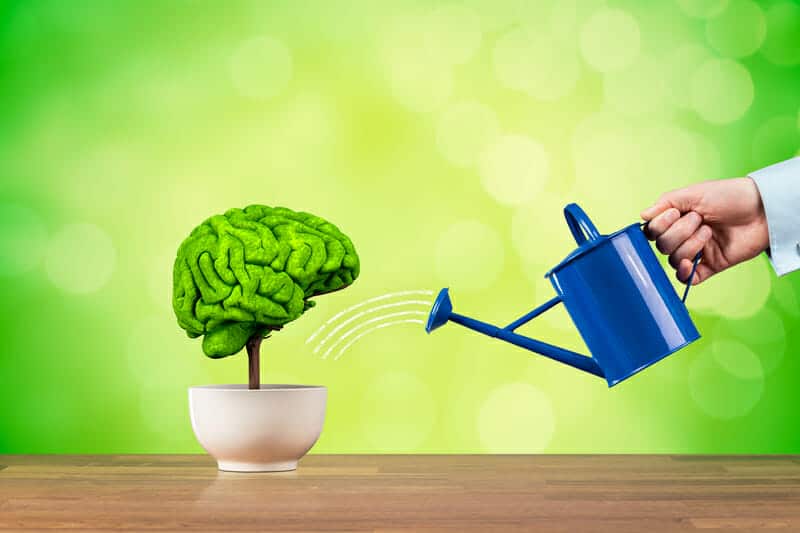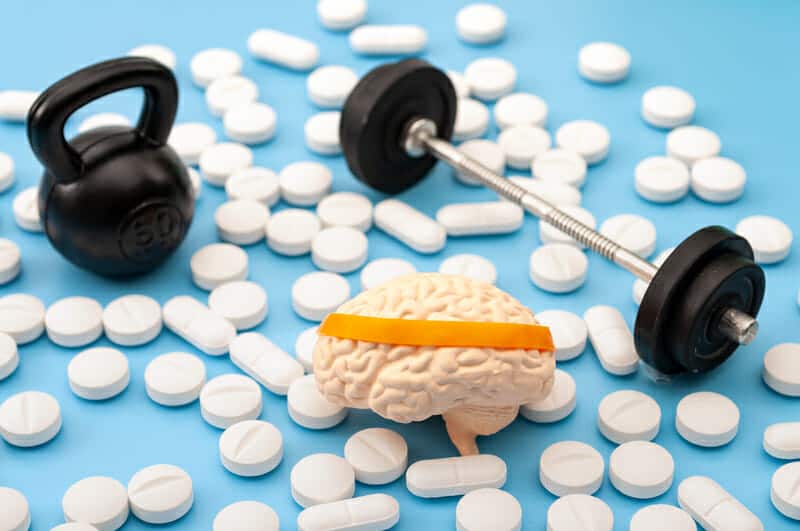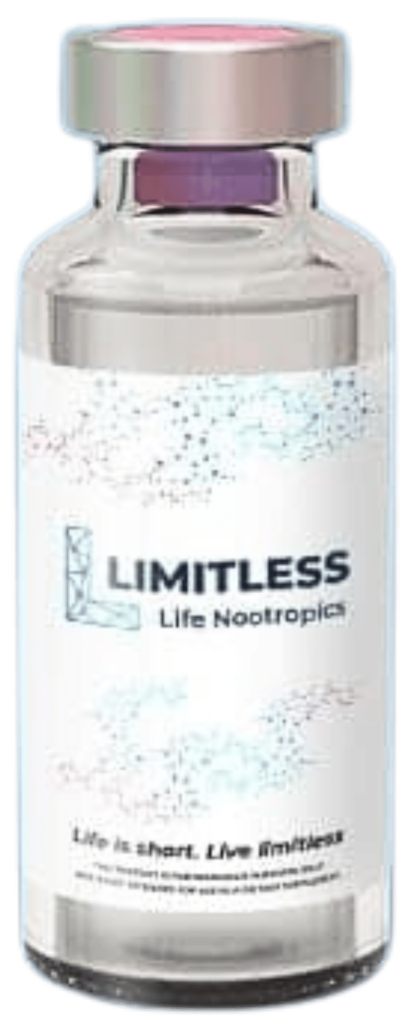Are you looking for the best nootropic peptides for brain function optimization?
If so, you’ve landed on the right site and you’re definitely reading the right article.
While I frequently talk about hormone optimization through the use of therapeutic testosterone and other adjuvants, there’s no reason to neglect the powerful supercomputer resting between your ears.
I want to stay smart, protect myself from diseases like Alzheimer’s, and keep myself sharp well past the age of 100.
Cognition-enhancing substances like Modafinil and Nicotine are still my classic go-to’s when I’m meeting a tight deadline, but I have something that may be better: nootropic peptides.
I’m convinced these substances will be the future of enhancing human intelligence and consciousness to the highest levels possible.
Keep reading to see how eight of these nootropic peptides could change our perception of what our brains are really capable of.
Table of Contents
ToggleWhat are Nootropic Peptides?

The easiest way to think about “nootropic peptides” is to define each word separately and then combine the two.
Peptides can be thought of as the smaller version of proteins, both of which are composed of a fundamental building block known as amino acids.
Proteins are usually 50 amino acids long or longer, while a peptide is anywhere between 2 and 5 amino acids long.
Peptides can come from numerous sources — they can be in the foods you eat, they can be naturally created by your body, and some of them are chemically synthesized in a lab.
Nootropics, on the other hand, have a more specific definition:
“any substance that may alter, improve, or augment cognitive performance, mainly through the stimulation or inhibition of certain neurotransmitters. Nootropics have been shown to increase concentration and memory potential and potentiate cognitive functioning”
In this context, cognitive performance can relate to any of the following functions: “learning, thinking, reasoning, remembering, problem-solving, decision making, and attention” (Source).
I would also go as far as to include cognitive function because it also encapsulates social activity and your overall mood, the latter of which can have a significant effect on your mental performance.
Therefore, it’s pretty easy to deduce what nootropic peptides are:
A peptide that is synthetically created or naturally produced by the body with the intention of positively regulating and/or improving one or more aspects of cognitive function in humans.
What Do Peptides Do in the Brain?

To really master your use of the best peptides for brain health, you have to know what you’re getting into.
You have to understand exactly how and why they work so you can get the most out of them.
For instance, there’s an experimentally synthesized peptide called Davunetide that shows great promise for treating Alzheimer’s.
While its effect is not strictly nootropic in nature, its protective ability is arguably cognition-enhancing because may lower the chances of contracting a neurodegenerative disease:
“A structure called “the microtubule network” is a crucial part of our nervous system. It acts as a transportation system within nerve cells, carrying essential proteins and enabling cell-to-cell communications. But in neurodegenerative diseases like Alzheimer’s, ALS, and Parkinson’s, this network breaks down, hindering motor abilities and cognitive function.
Now Prof. Illana Gozes of Tel Aviv University’s Sackler Faculty of Medicine has developed a new peptide in her lab, called NAP or Davunetide, that has the capacity to both protect and restore microtubule function”
Additional mechanisms Davunetide may trigger include the correction of mitochondrial dysfunction and inhibiting programmed cell death.
While clinical trials on this peptide were discontinued due to not meeting its endpoints in Phase II, it’s interesting to note Davenutide was safe and well-tolerated to the point where side effects between the treatment and placebo are virtually indistinguishable.
How about Ghrelin, a peptide naturally produced and distributed by your own body?
While it’s infamous for inducing an appetite, emerging research suggests it may play a role in regulating anxiety and depression:
“a 28 amino-acid stomach-derived peptide known for its powerful physiological orexigenic and adipogenic effects, as well as for its contribution toward the stress response, anxiety, and depression.”
“chronically elevated plasma ghrelin, associated with changes in the gut microbiota, can prevent anxiety- and depression-like behavior through ghrelin receptors”
One possible mechanism to explain this could involve the production of brain-derived neurotrophic factor (BDNF).
If you don’t know what that is, you really should.
BDNF is responsible for “controlling the synaptic interactions that influence memory and cognition mechanisms, and preventing apoptosis in the brain of mammals… [associated with] neurogenesis and neurogeneration in the mammalian brain” (Source).
Even to my own surprise, the two compounds are tightly linked to one another:
“Depression leads to a cognitive decline and decreases in ghrelin are observed in depression.
Ghrelin affects the level of Brain-derived nerve growth factor (BDNF) through the cAMP-CREB signalling pathway, and lower BDNF levels lead to cognitive decline.
Therefore, it is reasonable to assume that in depression, lower ghrelin causes a decrease in BDNF levels and cognitive decline though the cAMP- CREB signalling pathway.”
In summation, nootropic peptides influence cognition by enhancing cell-to-cell signaling and the regulation of other biological molecules that are heavily linked to important aspects of cognitive function.
Best Nootropic Peptides for Cognitive Enhancement

If you asked me about the best peptide for brain enhancement, I would say it entirely depends on what your goals are.
Fortunately for you, there are enough peptides engineered or naturally produced to handle different aspects of brain health.
One may be the right choice for getting a competitive edge in the workplace, and another is better suited for the aging athlete who is more focused on prevention of neurological disease.
I’ve already written about these cognitive peptides in great detail, so what you’re getting here are the high-level summaries.
Each peptide will include a link to the full article that investigates all of the technical details.
Read about what these peptide nootropics do, find what you need for your current situation, and go to the linked articles for more information.
Semax
Semax is a heptapeptide developed in Russia within the 1970s from a naturally-produced hormone called “adrenocorticotropic hormone” (ACTH) after human trials showed ACTH positively affected cognition but was unsuitable as a drug due to instability.
It’s not FDA-approved just yet, but Russia’s own pharmaceutical regulatory agency did approve its use in 1996 for multiple conditions.
Some of its most prominent uses include:
- Reducing pain via the reduced breakdown of enkephalins, endogenous compounds known for lowering inflammation
- Treating ischemic strokes
- Reversing undesirable effects of alcohol consumption via restoring function to the central nervous system
- Addressing the issues of various eye disorders
- Significantly improving memory and attention, even under extreme duress
- Increased learning capacity and verbal fluency, likely through increased BDNF production.
Overall, Semax is the all-rounder among the nootropic peptides: It’s neurorestorative, neuroprotective, and it provides the boost in cognition healthy biohackers are looking for.
Where Semax really shines is how the dose changes the effect you get.
While lower doses of Semax give you the boost in intellectual capacity, higher doses are used to address more serious conditions such as stroke recovery.
It’s no wonder that researchers in the know coined Semax as “a universal drug for therapy and research” way back in 2008!
Selank
Selank is a synthetic analog of tuftsin, an immunomodulatory peptide found in humans.
As a heptapeptide (i.e. seven amino acids long), it stands out from many other peptides in that it serves two primary functions.
The primary purpose of Selank is to reduce anxiety, and numerous human trials show it does so far better than drugs like benzodiazepines without the harmful side effects.
This is made possible through some of the same mechanisms responsible for Semax’s nootropic properties:
- Decreasing the rate at which enkephalins are degraded, which consequently decreases the anxiety response in humans
- Increasing BDNF production
- Lowering production of pro-inflammatory compounds in the brain
- Regulating the expression of dopamine and serotonin
The secondary purpose of Selank is to provide boosts in learning speed and memory (both long-term and short-term), although this is only confirmed by rat studies and the anonymous testimonials of a few brave biohackers.
So while you can use Selank to give yourself a transient increase in brainpower, it’s best to use it for calming yourself down and managing anxiety-associated conditions such as PTSD and ADHD.
And who knows — it might be better than the long course of antidepressants, stimulants, and tranquilizers your sick care doctor will put you on!
Dihexa
Dihexa is a six-amino-acid long peptide directly derived from Angiotensin IV (Ang IV), a metabolite of angiotensin II (a vasoconstrictor, ie increases blood pressure).
Similar to the discovery story of Semax, Ang IV itself can enhance the acquisition and recall of information… but it is easily degraded and therefore an unsuitable drug candidate.
Thanks to the investigation of scientists into the structural properties of Ang IV, it turns out the compound had specific structural motifs responsible for its cognition-improving properties.
And while we haven’t seen human trials come to fruition, here’s what we know about Dihexa so far:
- It is 7 orders of magnitude more powerful than BDNF in creating new neuronal connections and synapse formation
- Dihexa repairs already-occurred brain damage within the synapse between two nerve cells, rather than merely slow down the rate of disease progression in Alzheimer’s (thus showing superior potential over existing treatments
Additionally, anecdotal reports from experimental human use claim Dihexa can shorten reaction time, boost mental endurance and improve one’s problem-solving skills.
Much like Selank, I wouldn’t recommend using Dihexa as a nootropic.
I’ve personally used the peptide and it didn’t do much for me with respect to cognitive enhancement.
Dihexa is the peptide you should pick if cognitive repairment (in advance of a disease or during it) is your primary goal.
Cerebrolysin
Cerebrolysin is unlike the other nootropic peptides in that it isn’t a single peptide; rather, it is a complicated mix of amino acids derived from pig brains and neurpeptides such as BDNF and nerve growth factor (NGF).
This concoction works synergistically to stimulate protein synthesis and neuron growth, support their functions and help them to communicate with each other.
In plain English: Cerebrolysin restores damaged neurons and slows down neuron damage, while protecting them from the onset of unwanted symptoms.
Since its discovery in 1949, there have been multiple tested applications of this peptide mixture in humans and animals:
- Better clinical outcomes in patients suffering from traumatic brain injury (TBI)
- Marked improvement in cognitive function within patients suffering from dementia
- Enhancing cognitive control in young adults with ADHD
- Shows promise in treating Alzhemier’s Disease regardless of whether high or low doses are used
- Improved mental function in children diagnosed with Autism/Asperger’s
The last one really caught my attention, even as a close friend shared this 2017 clinical trial from motherland Russia:
“Forty-three children with autism spectrum disorders, aged 4-6 years, were included in the study. To assess the degree of autism, the quantitative scale of assessing the severity of child autism CARS (‘Childhood Autism Rating Scale’) was used. “
“In children with exogenous (organic) autism, the lower scores of autistic symptom on the CARS and a greater degree of functional immaturity of the cerebral cortex, according to electroencephalographic results, were found compared to children with endogenous autism.
After treatment with cerebrolysin, 27 children (62.8%) showed signs of improvement. An improvement was noted in 13 children in with endogenous autism (56.5%) and in 14 children with organic autism (70.0%). CARS scores showed a more pronounced decrease in this indicator in a subgroup of children with organic autism.”
While its primary use is best suited for preventing memory loss and cognitive decline, healthy people can also use it to improve their memory and overall cognitive functioning.
Think of this as more of a “neuroprotective” peptide for optimal brain health, rather than something like Modafinil for enhanced focus/wakefulness.
As for the autism treatment… I’m not necessarily endorsing that use, but I would sure love to see larger trials run on North American soil to see if we have a viable
Orexin A
Orexin A is a 33-amino-acid peptide that is predominantly located in the hypothamalus region of your brain.
While it was initially discovered as a peptide that increases feeding behavior, scientists accidentally found Orexin A played a large role in wakefulness.
Because when your body is deficient in Orexin A (i.e. low in neurons responsible for producing Orexin A), you aren’t aroused while you are awake and you are far more likely to go back to sleep for long periods of time.
It is part of a family of neuropeptides known as “orexins“, which are integral for cognitive health:
“The Orexin/Orexin Receptor (OXR) system plays a vital role in multiple functions of the central nervous system (CNS), including modulation of the sleep—wake rhythm, reward systems feeding behavior, energy homeostasis, and cardiovascular responses, as well as cognition and mood.
…Dysfunction of the orexin system has been implicated in many pathological conditions, including narcolepsy, insomnia, depression, ischemic stroke, addiction, and Alzheimer disease (AD)“
For this reason, Orexin A is being investigated as a treatment for narcolepsy when cataplexy is present (i.e. sudden muscle weakness while you are fully alert).
Not a great peptide to use when you’re attempting to lose body fat, but a great companion for somebody who is attempting to gain lean muscle mass yet struggles to get the extra calories in.
From the few testimonials of Orexin A I could find online, many people claim Orexin A’s wakefulness-enhancing properties allowed them to stay energetic all day long without falling asleep or needing to rely on ADHD medication.
It’s quite similar to Modafinil: Orexin A doesn’t so much enhance cognition as it puts you in a state where you retain wakefulness for longer periods of time, thereby offsetting the cognitive decline associated with sleepiness and tiredness.
I can’t say for sure if it’s going to replace Modafinil, but Orexin A is worth looking into if you’re seeking an alternative.
FGL
FGL (aka the Fibroblast Growth Loop peptide) is a 15-amino-acid long peptide that supports the growth and development of neurons, hence why it is known as a “neurotrophic” peptide.
There are arguably numerous mechanisms through which FGL purportedly helps people learn and retain new information, none of which appear to be more significant with respect to available data.
We also have mechanistic studies in cell cultures and rats that show promise in the follow areas:
- Protecting against neurotoxicity
- Possessing anti-neuroinflammatory properties
- Promoting neuron survival and synapse formation
- Possible treatment of psychiatric disorders
- Promoting cognitive recovery after stroke and TBI
Due to the lack of human trials, FGL is one of the more experimental nootropic peptides known to man.
And the biohackers are also mixed on this peptide – while some claim their brains have become more attuned to learning and maintaining a positive mood, my business partner and genius biochemist Nick Andrews did not notice any significant effects after taking extremely high doses of FGL every day.
So unlike the other peptides, I’m leaving the rest to you… try it for yourself and see if it boosts your brainpower in a meaningful way.
PE-22-28
PE-22-28 was brought to my attention when I was looking for peptides that exclusively focus on mood regulation.
The only thing I can reliably say about PE-22-28 is that it is the “anti-depressant” peptide among the optoins being listed here.
This is based on numerous rat studies where the peptide lowered the incidence of maladaptive depressive behaviors, especially in situations of chronically elevated stress.
But what makes it a standout candidate for treating depression is how it proved to be superior to antidepressants in the following ways:
- Faster onset of action (days for PE-22-28 versus weeks for traditional antidepressants)
- No negative effects on sleep
- No observation of withdrawal symptoms
- Absence of common side effects usually seen with antidepressants
While its use is far more targeted than FGL, it also belongs in the class of highly experimental peptides we don’t know too much about.
Melanotan I
Melanotan I was saved for last because it doesn’t really enhance cognition like the other seven peptides do.
Rather than help you memorize information or focus better, what this peptide does is increase consciousness.
I’ll quote myself from Living A Fully Optimized Life, where I talk about how Melanotan I’s melanin-increasing characteristic is the gateway to raising your vibration:
“[Melanin] has the ability to stimulate the pineal gland.
The pineal gland secretes the hormone melatonin (primarily during the hours of 2 a.m. to 6 a.m.), which literally bathes the brain and creates the chemical condition necessary for “inner vision” to take place.
It is Jay’s belief (based on empirical observation of his own life) that using [Melanotan I] has helped significantly in his spiritual evolution and connection to “WHAT IS” (a.k.a. his inner knowing expressed as the higherSELF or the soul).”
It’s not something I can easily describe, unlike my experiences with 5-MeO-DMT and RASHA Technology… I recommend reading those two articles if you want the best 3D description of what enhanced consciousness feels like.
And on a side note, it provides a more even and less severe skin tan compared to Melanotan II.
Cognitive Peptides Summary: Your Brain Is Limited By NOTHING!

You now have my full collection of the best peptides for brain enhancement and elevated consciousness.
Some nootropic peptides are more well-researched than others, some are more targeted towards a specific use instead of overall brain health, but they are the forefront of the Golden Age we need to manifest worldly change.
If you’re already set on trying one or more of these cognitive peptides out for yourself, head on over to Limitless Life Nootropics and access the world’s best supply of ultra-pure therapeutic peptides in existence.
Use code JAY15 at the checkout cart for 15% off!
IT IS also critically important if you are a newbie to peptides, you first download my Top 10 Mistakes People Make When Starting Therapeutic Peptides FREE PDF.
(Inside the deep FREE email sequence, you’ll also get access to my Therapeutic Peptides Course at 50% OFF)
And if you do manage to go through a full course of any of these peptides, send me an email and share your experiences with me!
Collaboration with one another is the way forward to discovering even more brain-enhancing peptides for the betterment of humanity.
As always…
Raise Your Vibration To Optimize Your Love Creation!
PS – If you want to read intel like this many months ahead of when I plan to speak of my health discoveries in public, join The Fully Optimized Health Private Membership Group.
It’s your greatest opportunity to fully optimize your health and gain total access to me and my network of high-level men and women living their highest and best life.



